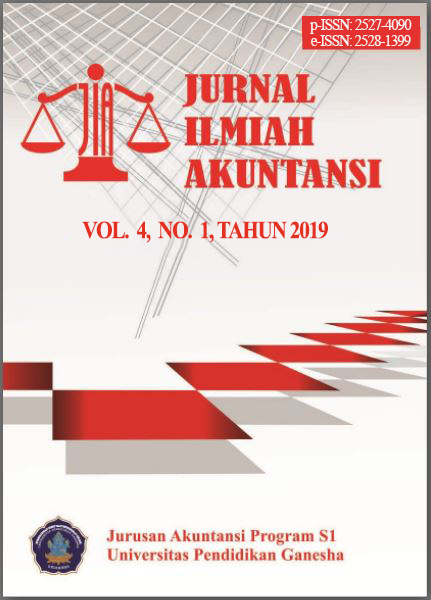KOMITMEN ORGANISASIONAL, MOTIVASI LAYANAN PUBLIK DAN KINERJA LAYANAN DALAM SEKTOR PUBLIK
DOI:
https://doi.org/10.23887/jia.v4i1.15654Abstract
Penelitian ini bertujuan untuk membangun satu model manajemen kinerja Sektor Publik. Dalam melaksanakan penelitian ini, peneliti menggunakan metode penelitian kuantitatif dengan menggunakan alat analisis statistik SmartPLS 2.0.M3. Penelitian ini dilakukan pada dinas dan badan yang ada dilingkungan pemerintah kota medan dengan menggunakan 162 sampel. Dari analisis data yang dilakukan, diketahui bahwa terdapat hubungan signifikan antara hubungan kerja dengan atasan (HKDA) terhadap komitmen organisasional (KO) dan motivasi layanan publik (MLP). Sementara itu, tidak terdapat hubungan signifikan antara organisasional tenure terhadap komitmen organisasional dan motivasi layanan publik. Terlihat signifikan hubungan antara pengembangan karir (PK) terhadap komitmen organisasional (KO) namun tidak signifikan terhadap motivasi layanan publik (MLP). Persepsi Pegawai mengenai Organisasi (PPO) memengaruhi signifikan Komitmen Organisasional (KO) dan juga terhadap Motivasi Layanan Publik (MLP). Tuntutan akuntabilitas (TA) tidak berpengaruh signifikan terhadap komitmen organisasional (KO), namun berpengaruh terhadap motivasi layanan publik (MLP). Tingkat pendidikan tidak berpengaruh terhadap komitmen (KO) dan motivasi layanan publik (MLP). Tidak terdapat hubungan signifikan antara komitmen organisasional terhadap kinerja (K). Terdapat hubungan signifikan motivasi layanan publik (MLP) terhadap kinerja (K). Terakhir, bahwa komitmen organisasional tidak memediasi hubungan antara motivasi layanan publik terhadap kinerja.References
Adler, R., dan Corson, D. 2003. Organizational commitment, employees and performance. Chartered Accountants Journal of New Zealand, 82(3), 31-33.
Allen, N.J., dan Meyer, J.P. 1990. The Measurement and Antecedents of Affective, Continuance and Normative Commitment to the Organization. Jounal of Occopational Psychology, 63, 1-19
Balfour, L. Danny., Wechsler, Barton. 1991. Commitment, Performance, and Productivity in Public Organizations. Public Productivity & Manajement Review, Vol. 14, No. 4, pp. 355-367
Benkhoff, B. 1997. Ignoring commitment is costly: New approaches establish the missing link between commitment and performance. Human Relations, 50(6), 701-726.
Camilleri, Emanuel., dan Van Der Heijden, Beatrice, I.J.M. 2007. Organizational Commitment, Public Service Motivation and Performance Within the Public Sector. Public Performance & Manajement Review, Vol. 31, 241-274
Finegan, J.E., 2000. The impact of person and organizational values on organizational commitment. Journal of Occupational and Organizational Psychology, 73(2), 149 164.
Flippo, Edwin B. 1984. Personnel Manajement. McGraw-Hill, Inc
Friel, Brian. (1998). Faith Healers. Government Executive 30(4), 43-45
Gerstner, C.R., dan Day, D.V. 1997. Meta-Analytic Review of Leader-Member Exchange Theory : Correlates and Construct Issues. Journal of Applied Psychology, 82, 6, 827-844
Hemmasi, Masoud; Graf, Lee A; Lust, John A., 1992. Correlated of Pay and Benefit Satisfaction : the Unique Case of Public University Faculty. Public Personal Manajement 21(4), 429-443
Hemmasi, Masoud; Graf, Lee A; Lust, John A., 1992. Correlated of Pay and Benefit Satisfaction : the Unique Case of Public University Faculty. Public Personal Manajement 21(4), 429-443
Kacmar, M.K., Bozeman, D.P, Carlson, D.S., & Anthony, W.P. 1999. An examination of the perceptions of organizational politics model: Replication and extension. Human Relations, 52(3), 383-416.
Kim, Seok-Eum., Lee, Jung-Wook. 2007. Is Mission Attachment an Effective manajemen Tool for Employee Retention. Review of Public Personnel Administration, 27: 227-248
Light, P. C. 2000. Makings nonprofits work: A report on the tides of nonprofit management reform.Washington, DC: Brookings Institution.
Luthans, Fred. 1995. Organizational Behavior. McGraw Hill Inc. Singapore.
Muslim, dkk 2005. Persepsi Masyarakat Terhadap Kualitas Pelayanan Publik Pada Kantor Dinas Kependudukan Kota Medan. Jurnal Studi Pembangunan, Vol 1 No 1
Nyhan, R.C. 2000. Changing the paradigm: Trust and its role in public sector organiza tions. American Review of Public Administration, 30(1), 87-109.
Peraturan Pemerintah (PP) No. 9 Tahun 2003 Tentang Wewenang Pengangkatan, Pemindahan, dan Pemberhentian Pegawai Negeri Sipil
Perry, J. 1996. Measuring public service motivation : An assessment of construct reliability and validity. Journal of Public Administration Research and Theory, 6(1), 5-22.
Prawirosentono, Suyadi, 1999. Manajement Sumber Daya Manusia : Kebijakan Kinerja Karyawan, BPFE Yogjakarta.
Smith, S. R., & Lipsky, M. 1993. Nonprofits for hire: The welfare state in the age of contracting. Cambridge, MA: Harvard University.
U.S. Merit Systems Protection Board. 1987. Working for the federal government: Job satisfaction and federal employees. Washington, D.C.: GPO.
Undang-undang RI no. 05 tahun 2014 tentang Aparatur Sipil Negara
Van Dyne, L., Graham, J.W., & Dienesch, R.M. 1994. Organizational citizenship behavior: Construct redefinition, measurement, and validation. Academy of Management Jour nal, 37(4), 765-803.
Wilson, J. Q. 1989. Bureaucracy : What government agencies do and why they do it. New York: Basic Books.



1.png)


